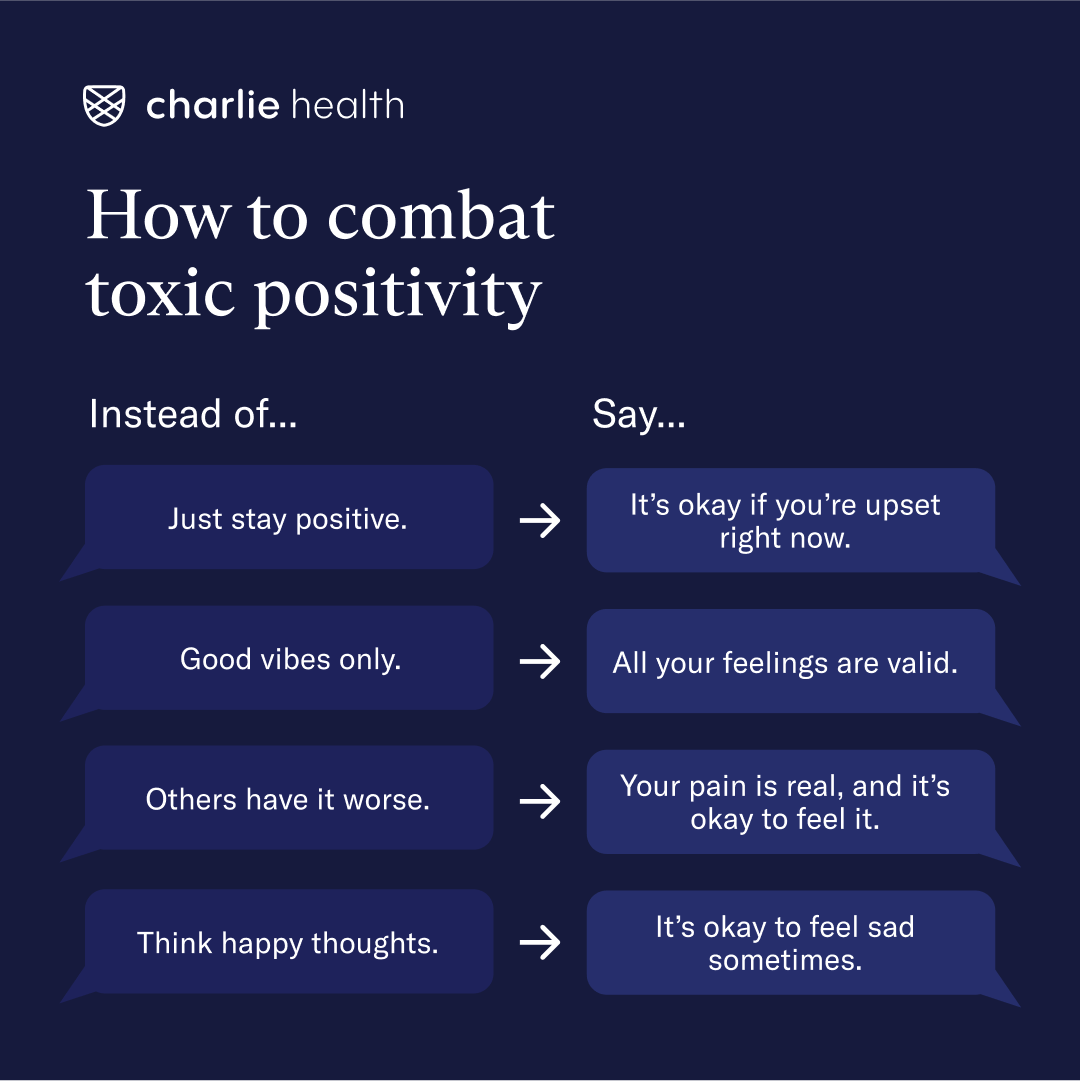
Table of Contents
What Is Toxic Positivity?
Written By: Charlie Health Editorial Team
May 24, 2021
3 min.
Toxic positivity refers to the idea that in any given circumstance the most appropriate course of action is to remain positive, “look on the bright side,” and understand that “it could be worse.” An optimistic perspective can be a healthy and effective coping mechanism; however, toxic positivity refers to the extreme, unwavering presence of positivity in which this attitude causes a failure to effectively process and validate emotions.
Learn more about our Clinical Review Process
Table of Contents
Toxic positivity refers to the idea that in any given circumstance the most appropriate course of action is to remain positive, “look on the bright side,” and understand that “it could be worse.” An optimistic perspective can be a healthy and effective coping mechanism; however, toxic positivity refers to the extreme, unwavering presence of positivity in which this attitude causes a failure to effectively process and validate emotions.
Whereas healthy optimism seeks to motivate and inspire individuals to be their best selves, toxic positivity creates a false sense of reality—that emotions aren’t meant to be felt and are inherently bad. Many times, individuals who engage in toxic positivity do so innocently, perhaps without realizing its effects on others.
It’s critical to normalize feeling emotions through validating others’ experiences. What may not seem like a stressful event in your life, may in fact challenge, provoke anxiety, or overwhelm someone else. Validating someone’s experience or taking the time to make them feel heard and acknowledged, allows for critical growth and respect among all kinds of relationships.
If you’ve engaged in toxic positivity, you’re not alone. For many of us, when we hear someone we care for struggling we interject with comments such as “just stay positive” or “don’t stress about it” to support and encourage them. In uncomfortable circumstances, it’s instinctive human behavior to avoid someone’s pain or brush it off. This dissociates us from having more difficult, vulnerable conversations. Showing empathy and allowing others to feel heard requires active choices and may not come naturally to everyone. You may not even realize you are exhibiting this behavior. It’s important to think critically about your words, and how you can support others through minimizing toxic positivity.
When individuals have experienced toxic positivity from others they tend to internalize and enforce it upon themselves. This causes individuals to hide their emotions, become overly stoic, or feel guilty about the challenges they are navigating. A lack of space and willingness to process emotions can lead to more severe mental health challenges.
How to Avoid Toxic Positivity
- Emotions exist on spectrum. Acknowledge that it’s okay to feel an array of emotions at once and you don’t need to make excuses for them.
- Be honest and authentic about your emotions. Carveout time to reflect and process.
- Be an active listener and validate others.Understand (ask!) when others want to be heard and supported versus when they are requesting advice or commentary.
- Empathy doesn’t come always come naturally, it’s a skill that takes time to develop and authentically practice.
- Identify when you or those around you are exhibiting toxic positivity. It’s okay to make mistakes. By learning to recognize it, you will be more adept at supporting yourself and others.

Contact Us
Charlie Health’s team of licensed clinicians is here to support teens, young adults, and families struggling with mental health to process and navigate challenges together. Reaching out for help is a critical step in your journey towards healing. Professionals are available to listen to your needs, answer your questions, and match you with a treatment program that fits your needs.





